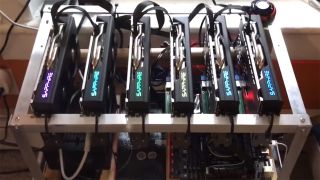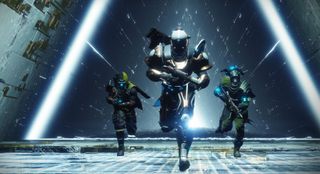Wes Fenlon: Loot boxes make for homogenous game design

I think everyone is pretty tired of talking about, and hearing about, loot boxes, but they really are the biggest topic in gaming in 2017, and I think the industry's low point of the year. There are many reasons to dislike them, even cosmetic boxes like Overwatch's, and there are real concerns about how those systems lure in players with addictive tendencies. There are definitely people spending money on loot boxes who can't afford it—not all whales are millionaire lawyers with piles of cash to burn.
I'm thankful loot boxes don't have that kind of pull for me. But even if I don't spend money on them, they're in the games they play, making those games worse. Here's what I had to say about loot boxes on the PC Gamer Show a few months ago, about how they take some of the excitement and mystery out of games by making them too similar.
They're boring. Hopefully this year's backlash means we see far fewer of them in the new year.
Jarred Walton: Component prices aren't meant to rise over time

This has been a strange year for certain segments of the computer hardware scene. Normally, the trend is for everything to get 'better'—faster, smaller, more efficient—while at the same time becoming more affordable. That state-of-the-art PC you bought in 2014 for $3,000 will be slower than this year's mainstream $1,500 system. But for GPUs, SSDs, and RAM, 2017 decided to go a different direction.
Cryptocurrency mining had a major impact on graphics card prices, peaking with cards like the RX 570 and RX 580 selling for more than twice their official launch price. Even now, nine months later, you can't buy an RX 570 4GB for under $200, and it was supposed to be a $169 card. Nvidia weathered the storm a bit better, though GTX 1070 is still nowhere near its all-time low of $350, and with Bitcoin flirting with the $20,000 mark, Ethereum at $800, and Bitcoin Gold at over $4,000, we're still not done.
DDR4 RAM and SSD prices meanwhile have remained high throughout the year. This is mostly thanks to the increased demand from the smartphone sector, where 64GB NAND is now common on high-end models like the iPhone 8 and Galaxy Note 8, the latter of which packs 6GB RAM. Increased supply is supposed to help reverse the trend in 2018, though you can't help but worry about the prices being kept high next year.
Tim Clark: Destiny 2

The moment I first clapped eyes on Destiny 2 at the reveal event in May, running in 4K at 60+ FPS, could easily have been my high of the year. But as we know, what followed has been something of a shuttle crash. It's not that Destiny 2 is a bad game when viewed in isolation. I completely agreed with Tom's verdict that there was an excellent 60-70 hours of grind to be had, and it's especially fun played with friends, as our awards noted. But Bungie's fundamental blunder—and the more I think about it, the more arrogant it looks—was the idea that the sequel could be tailored almost entirely for the casual audience, and the hardcore players would just suck it up and stick around because, hey, that's what they do. Or perhaps even more cynically, maybe the bean counters felt it didn't matter if nobody sticks around so long as enough of them bought the base game, season pass, and some of the baubles in the microtransaction store.
PC Gamer Newsletter
Sign up to get the best content of the week, and great gaming deals, as picked by the editors.
If the vacuum where the endgame should've been was the only issue, then that would have been bad enough. But Bungie compounded the issue with a string of mistakes, from a hidden XP throttling system, to an exotic weapon released seemingly untested, to a DLC expansion that locked vanilla players on PC out of stuff they paid for just over six weeks ago. It's been a baffling series of self-inflicted wounds, and I can't recall such a big studio having to issue so many apologies, so soon after launch. What's most frustrating is that I still love much about the game and still spend a lot of time—too much!—playing it.
The universe Bungie has built, how the weapons look and feel to fire, and the amazing experience of raiding with a team of friends are all things I don't want to leave behind. I think underpinning all the game's problems, though, is the studio's focus on scooping up as much Eververse store money as possible. Somewhere the path to what made the game fun in the first place has been severely strayed from. It's not understating it to say that the changes that need to happen in 2018 will make or break the game. I hope Bungie sees how seriously it needs to reconsider its current approach to making money from the playerbase. For the extended dance remix version of this discussion, here are my thoughts on Curse of Osiris.
The collective PC Gamer editorial team worked together to write this article. PC Gamer is the global authority on PC games—starting in 1993 with the magazine, and then in 2010 with this website you're currently reading. We have writers across the US, UK and Australia, who you can read about here.
Most Popular



